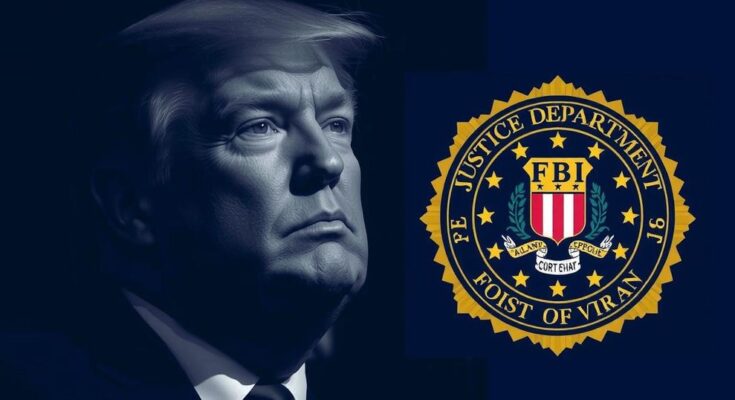Matt Gaetz’s potential nomination as attorney general by Donald Trump has created significant unease within the Justice Department and FBI, prompting officials to seek job security amid fears of retribution. Gaetz’s fierce opposition to these agencies suggests a major shift in their operational landscape as federal prosecutors and career lawyers prepare for potential upheaval. With a backdrop of aggressive political agendas, the atmosphere is charged with uncertainty, foreshadowing potential chaos post-transition.
As Donald J. Trump contemplates nominating Matt Gaetz for attorney general, ripples of anxiety have spread through the Justice Department and the FBI. Gaetz, a steadfast Trump ally and fierce opponent of these agencies, has stirred concerns among federal law enforcement officials. His audacious style promises to reshape the DOJ, sending a clear warning to career officials: comply with Trump’s ambitions or brace for consequences. The atmosphere is reminiscent of the turbulent days following Trump’s firing of FBI Director James Comey in 2017, placing career prosecutors on high alert. In response to this political upheaval, staff members have begun taking measures to safeguard their careers. Some have sought legal insurance, while others discreetly pursue opportunities in the private sector amidst fears of retribution. Following Trump’s victory, a notable uptick in resumes from DOJ officials seeking to exit the public sphere was reported, highlighting the uncertainty and potential chaos that lie ahead. Gaetz, whose past investigations have haunted him regarding allegations of sex trafficking, presents himself as an avenger for Trump’s war against perceived enemies within the FBI. Critics note that his selection aims to intimidate and dismantle the current structure, primarily shaped by officials whose roles involve overseeing investigations into Trump’s conduct. As preparation for a tumultuous transition unfolds, the FBI is adjusting leadership. Director Chris Wray intends to continue but faces changes in his team as senior officials depart. The message from Trump’s camp is clear: any noncompliance among career DOJ staff will likely be met with backlash. These dynamics evoke memories of the political manipulations surrounding Trump’s previous term, where his administration greatly influenced agency direction. Despite the swirling fears of a mass exodus, many officials remain as steadfast as they are wary, having faced similar threats before. Still, discussions among prominent legal minds to form a network for pro bono representation looms as a protective measure against potential political retribution. The combative atmosphere is compounded by announced conservative priorities, suggesting a radical shift away from the previous administration’s policies and further indicating the aggressive reboot Trump’s team desires. In the end, the specter of Trump’s possible return to power casts a long shadow over the Justice Department, upsetting the equilibrium that those within have fought to maintain. As the days count down to new beginnings, the stage is set for a fierce clash between Trump’s allies and the federal law enforcement community, with the outcome yet uncertain.
The article addresses the tense atmosphere within the Justice Department and the FBI following Donald Trump’s anticipated nomination of Matt Gaetz as attorney general. Gaetz has long been a vocal critic of these federal institutions, portraying them as adversaries in Trump’s ongoing political clashes. The piece explores how this potential nomination has raised alarms among career officials who fear for their positions amidst a backdrop of aggressive political maneuvering and possible retribution for their past actions against Trump.
In conclusion, the nomination of Matt Gaetz as potential attorney general signals a profound shift in the Justice Department’s dynamics, creating an atmosphere rife with fear and uncertainty. As officials grapple with the implications of Trump’s return, they must navigate a treacherous terrain characterized by threats, urgency to seek protection, and the looming specter of ideological shifts within the DOJ. The future of federal law enforcement hangs precariously in the balance, awaiting the unfolding of new political realities under a familiar leadership.
Original Source: www.nytimes.com



